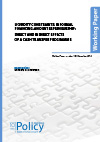
Liquidity Constraints, Informal Financing, and Entrepreneurship: Direct and Indirect Effects of a Cash Transfer Programme
Abstract:"This paper exploits a liquidity shock from a large-scale welfare programme in Brazil to investigate the importance of credit constraints and informal financial assistance in explaining entrepreneurship. Previous research focuses exclusively on how liquidity shocks change recipients’ behaviour through direct effects on reducing financial constraints. However, the shock may also produce spillovers from recipients to others through private transfers and thereby indirectly affect decisions to be an entrepreneur. This paper presents a method for decomposing the liquidity shock into direct effects associated with relieving financial constraints, and indirect effects associated with spillovers to other individuals. Results suggest that the programme, which assists 20 per cent of Brazilian households, has increased the number of small entrepreneurs by 10 per cent. However, this increase is almost entirely driven by the indirect effect, which is related to an increase in private transfers among poor households. Thus the creation of small businesses tends to be more responsive to the opportunity cost of mutual assistance between households than to financial constraints."(...)
This publication can also be founded in a condensed and/or expanded format: